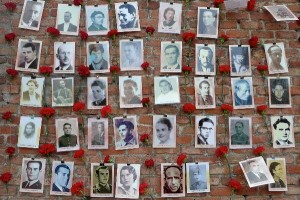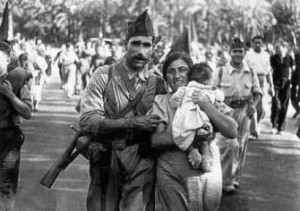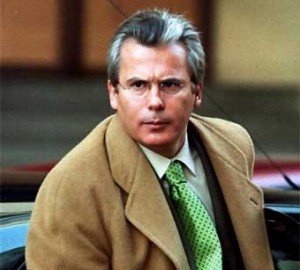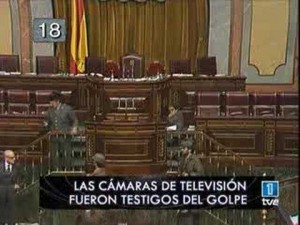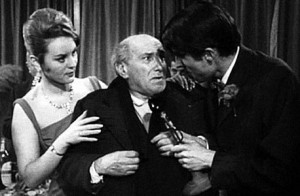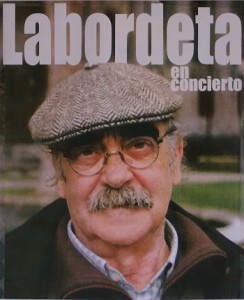A true city of the dead, five million bodies lie buried in Madrid’s Our Lady of the Almudena Cemetery. And bar the towering cypresses, it’s a monochrome landscape of powerful granite tombs and austere crucifixes. Winding through the graves, half lost, I finally glimpsed a flash of colour. Red, yellow and purple - the flag of the Spanish Republic. This year marks the 80th anniversary of the Second Spanish Republic. A short lived affair, running from 1931 to 1939, the Republic was ring-fenced by dictators. And for many left-wing Spaniards it represents an oasis of progressive secular government - women’s rights, civil marriage and divorce, clear Church and state separation - before … [Read more...] about Spain’s buried past
Franco
Franco and the red pen
One of the upshots of the recent furore surrounding the recently published Diccionario Biográfico Español has been how it has highlighted the decrepit and ideologically questionable nature of the Spanish Royal Academy of History (RAH). Of its 36 members, 15 are over 80 years old, only three are women and among its many right-leaning experts, several are seemingly pro-Franco. The most obvious example is Luis Suárez, the historian who wrote the now-notorious dictionary entry on Francisco Franco, painting the dictator in a flattering light. Clearly, the RAH has a problem in terms of its personnel, which makes providing objective and serious accounts of Spanish history difficult, if not … [Read more...] about Franco and the red pen
Spain’s conflicting memories refuse to fade
The now infamous entry in Spain’s recently published biographical dictionary describes General Francisco Franco as a courageous figure who set up an “authoritarian, but not totalitarian” regime. Written by 86-year-old historian Luis Suárez, the entry paints Western Europe’s longest-serving dictator in a favourable light, extolling his military prowess. This account of Franco’s reign differs sharply from that outlined by British historian Paul Preston in his latest book, The Spanish Holocaust: Inquisition and Extermination during the Civil War and After. In fact, Professor Suárez makes no mention of Francoist atrocities at all. The furore sparked by Suárez’s dictionary entry is … [Read more...] about Spain’s conflicting memories refuse to fade
The Spanish holocaust
Even to this day, when asked about the slaughter and repression carried about by General Francisco Franco during the Spanish Civil War and in the years that followed, the standard reply from many Spaniards is that atrocities were committed on both sides. But in this relentlessly harrowing read, British historian Paul Preston provides, page after page, factual, documentary accounts of the systematic policy introduced by Franco early on in the war to rid the country of the red menace and to install a reign of terror among the few that might still contemplate resistance. This was accomplished through disappearances, and in many cases, the murders of entire families, along with theft of young … [Read more...] about The Spanish holocaust
Garzón appeals to Strasbourg over prosecution for Franco-era probe
Judge Baltasar Garzón has filed a case to the European Court of Human Rights challenging the lawfulness of his prosecution for opening an investigation into crimes committed during the Franco era. Judge Garzón was suspended from his position in the High Court in May of 2010 pending the outcome of his trial for abuse of power. No date has been set. In 2006, in line with his role as one of six investigating judges at Spain’s High Court, Garzón began a preliminary investigation following requests by the families of victims of repression by the Franco regime to ascertain the legality of a prosecution. His analysis of Spanish law, as well as the body of developed international law in this … [Read more...] about Garzón appeals to Strasbourg over prosecution for Franco-era probe
March 11’s divisive legacy (revisited)
In the middle of February, the Spanish government announced that it was going to “repair” the memory of the poet Miguel Hernández, a Republican former goatherd who was jailed by the dictator Francisco Franco and died in prison in 1942, at the age of 31. The Socialist government pledged to offer Hernández, whose centenary is being celebrated this year, “the tribute, the memory and the admiration that his work merits,” said Deputy Prime Minister María Teresa Fernández de la Vega. “We all share that same rejection of any form of oppression, that same rebellion in the face of injustice and that determination to dream and create a decent country and a better world.” The news of this homage … [Read more...] about March 11’s divisive legacy (revisited)
King Juan Carlos
The boyish grin, the Bourbon nose, the endless joshing: even if he wasn’t the king of Spain, you could spot Juan Carlos a mile off. But despite the down-to-earth bonhomie, he has a livelier CV than most living monarchs. Juan Carlos accidentally shot his brother dead with a hunting gun as a child. He then became the protégé of dictator Franco, expected to ensure the country stayed “old school”. But Juan Carlos proved he was more than a tyrant’s puppet by steering Spain into democracy and then foiling a 1981 attempted coup with a now-historic television address to his people. All by the age of 43. Who can blame him for enjoying the high life since? … [Read more...] about King Juan Carlos
The Tejero coup, North Africa and back-slapping
That day is widely seen as a turning point in modern Spanish history – the moment when the country’s commitment to democracy was bolstered following the firm action of King Juan Carlos in putting down the putsch. But in his column Ramoneda identifies an exaggerated sense of self-congratulation in the memory of that day now, charging that “we commemorate 23-F in a tribe-like way, without being capable of thinking for one minute about those who today fight for democracy.” And those who fight for democracy today are on Spain’s doorstep. Spain and Europe have failed to send a clear message to North Africa in recent weeks, Ramoneda charges. Spain is a country with particular … [Read more...] about The Tejero coup, North Africa and back-slapping
Berlanga, the bad Spaniard
Luis García Berlanga, who has died aged 89, will be remembered not just for his wonderful films: in making them he also led the shift towards serious film-making in Spain in the 1950s and 1960s. His achievement is all the more remarkable in the context of a military dictatorship that had either eliminated or forced into exile most of the artists who had flourished during the all-too-brief Second Republic. Looking back at his hallmark movies made during the depths of the Franco dictatorship, one can only marvel at his courage and determination, along with his ability to outwit the general’s censors. And while Berlanga was a thorn in the side of the regime —from his first film in 1951 to … [Read more...] about Berlanga, the bad Spaniard
Labordeta: Aragon’s protest-song politician
Politics and sport don’t mix, so the saying goes. Except in the case of Madrid’s working class heroes Rayo Vallecano. The third-tier soccer club’s famously leftist fans observed a minute’s silence before the start of their game on September 26 against Aragonese side Huesca in memory of José Antonio Labordeta, the singer, poet, and politician who died on September 18 after a long illness. Labordeta came to prominence in the final years of the Franco regime by combining traditional Aragonese tunes with modern Spanish folk music, and captured the spirit of a generation tired of waiting for the dictator to die. Over the years he stuck to his principles, vociferously opposing Spain’s initial … [Read more...] about Labordeta: Aragon’s protest-song politician
